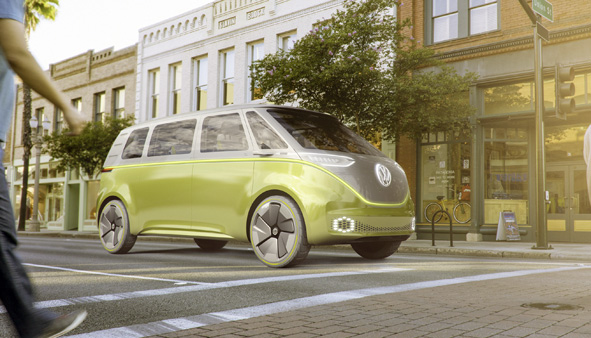Volkswagen plans autonomous shuttles in Doha by 2022 Steve Rogerson
- January 7, 2020
- imc

The Qatar capital Doha will see a fleet of self-driving level-four electric shuttles on its streets by 2022 following a partnership between German car maker Volkswagen and the Qatar Investment Authority (QIA).
Last month at the Doha Forum in Qatar, in the presence of several Qatari dignitaries, representatives of Volkswagen and the QIA signed the Project Qatar Mobility agreement.
The goal is to develop an autonomous transport project and transform the future of urban mobility to a sustainable and commercial deployment of autonomous driving (AD) shuttles and bus services. The cross-brand collaboration is seen as blueprint for future AD collaborations with Volkswagen Commercial Vehicles (VWCV), Scania, MOIA and AID-Autonomous Intelligent Driving all involved. The aim is for Qatar to be the venue for the world’s first emission-free, electric and autonomous public transport system.
The agreement was signed by QIA CEO Mansoor Al-Mahmoud and Herbert Diess, chairman of Volkswagen Group, at a ceremony in Doha.
QIA and Volkswagen will work together to develop the required physical and digital infrastructure to integrate a fleet of self-driving vehicles seamlessly into Doha’s existing public transport network. Autonomous, electric ID Buzz AD from Volkswagen will shuttle up to four passengers in the Westbay area on semi-fixed routes, while high-tech Scania buses pick up larger groups. Volkswagen’s units AID and MOIA will provide the knowledge and the app software to run the service.
The project aims to create a holistic ecosystem for autonomous driving, including the creation of an appropriate legal framework, smart city infrastructure and transfer of knowledge, which can be used as a blueprint to transform urban mobility, both in Qatar and beyond. Closed testing of the shuttle vehicles and buses is expected to begin this year and trials will start in 2021. The project will go live during 2022, providing a technical showcase of future autonomous driving.
“Project Qatar Mobility will play a very important role in our Strategy Together 2025+,” said Diess, “addressing the economic growth, social development and environmental management challenges identified as part of our vision, and underlining our commitment to investing in next generation mobility. We will be experiencing real-world learnings and use the project as a stepping stone for generations to come.”
Within the Volkswagen Group, VWCV is responsible for autonomous driving, mobility as a service (MaaS) and transport as a service (TaaS), because the first use cases are planned in the commercial sector. In future, VWCV will be developing and producing corresponding special purpose vehicles, such as robo-taxis and robo-vans.
“At Scania, our purpose is to drive the shift to sustainable transport,” said Henrik Henriksson, CEO of Scania. “In the coming years, technological and infrastructural progress in electric and autonomous vehicles will be key enablers in that shift. With regards to people transport, a higher degree of sharing is also important and, through advances in autonomous transport, it will be simpler to introduce more flexibility in shared people transport. It is exciting to play a role in cutting edge projects like this one in Qatar.”
QIA’s investment strategy is based on a responsibility to generate strong and sustainable returns. QIA is a long-term investor in the Volkswagen group and has two representatives on its supervisory board of directors.
“For our cities to progress we need a new wave of innovation,” said Al Mahmoud. “AI-enabled, emission-free transportation technologies will help advance urban mobility, while diminishing congestion and improving energy efficiency. We are proud that QIA has been able to partner with Volkswagen to ensure that Qatar is at the forefront of these new technologies. The development of smart transport will help transform the future of urban mobility, both at home and around the world.”
MOIA, a subsidiary of Volkswagen, develops mobility services and works in partnership with cities and local public transport operators. It is developing and implementing a ride-pooling system to avoid individual car traffic and to use the road infrastructure more efficiently. Cities are relieved of congestion, noise and emissions. MOIA started its on-demand bus service in the German cities of Hannover and Hamburg.
AID-Autonomous Intelligent Driving is VW’s centre of excellence for developing level-four autonomous driving in urban environments for the whole VW group. Headquartered in Munich, the AID team has more than 260 experts from 47 nations.





